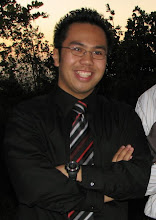 Above: May 2009. First time I ever popped an umbrella with Mary Poppins. I hope there'll be a second time.
Above: May 2009. First time I ever popped an umbrella with Mary Poppins. I hope there'll be a second time.THERE'S ALWAYS A FIRST
FOR EVERYTHING.
Last week was filled with a bunch of firsts. Here's five.
1. FIRST BLOOD DRAW.
Blood drawing can be intimidating for all the parties involved. On the patient end, seeing needles and blood is not exactly a pleasant sight. On the doctor end, it can be scary to not find a vein or take a wrong approach to inserting the needle, as both may cause discomfort to the patient. Adding both can lead to a stressful situation, but with the help of the patients in the chair, it made my experience much more inviting.
"If I can be the guinea pig and can handle being drawn blood from all of these sites, you can do it," one of the patients told me. I came out clean and was honest about telling the patient this was my first time. Tourniquet on. Search for vein. Spotted. Alcohol swab. Swished it around. Insert needle. Tube in. A flash of crimson blood entered the tube and it began to fill. I thank the patient in the chair for making my first try successful. I guess the first time isn't so bad with the right support.
2. FIRST FETAL OCCULT BLOOD TEST.
Okay, I'll skip the details, but we had to analyze for blood in a patient's stool to eliminate the possibility of any GI conditions. When our attending requested someone to do it, the hand that always gets me in trouble went up in the air. I soon was in to get the sample. This first showed to me that after the first time, its easy to get into the rhythm of things. Sometimes, exposure to the extreme is just what one needs to cross barriers.
3. FIRST PAP SMEAR ASSISTING.
I wanted to say "actual pap smear," but this was simply an assist. Getting a pap smear is intimidating for a male-doctor-in-training, for obvious reasons. But with the help of four other female doctors & nurses in the room, I was able to get through it. A complex process if done by self, but hopefully I'll be able to be in the hot seat with my awesome support team finally this week to try one.
4. FIRST TIME IN COUNSELING MODE.
I won't get too much into the story here, partially because of HIPAA and second because most of the situation occurred in Spanish (a lot more than Señor Fixity-Fix-It below). But I learned today that there are times that it is okay to step across the professional barrier, and not call someone by last name and to be honest about what's going on.
A lot did go over my head during the patient interaction, with some translated by an accompanying PA in the room. However, with even the little I knew, I went ahead, was honest, and told the patient, "No hablo mucho español, pero cree que eres un hombre/mujer fuerte. Puedes hacer todo,"* the reply of "Gracias" and a smile made me know that I connected with the patient when I needed to. I'm a sucker for emotional moments, but they're one of the most beautiful things about life.
*Translation: "I can't speak much Spanish, but I think that you are a strong man/woman. You can do everything."
5. FIRST BERRY & OREO ICE CREAM COMBO AT COLDSTONE CREAMERY.
One word: simply amazing. Okay, that's two, but that's how good it was... especially after enjoying the new movie release Kick-Ass.
And with all these firsts, I hope there will be seconds.



